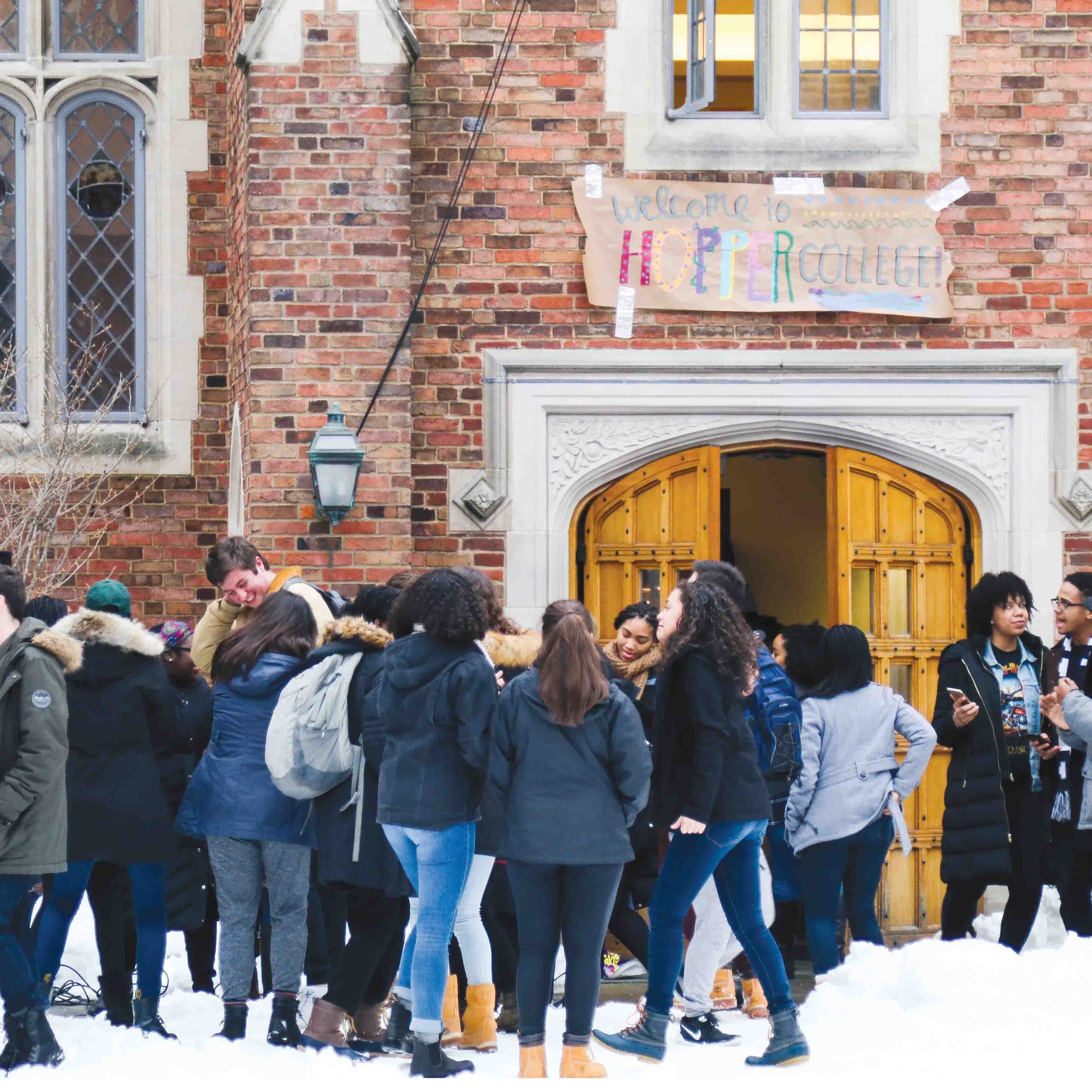
Freshmen in Entryway C of Bingham Hall gathered in the common rooms of their freshman counselors around 10 p.m. Saturday night, shirts and permanent markers in hand. The time had come to finally fill in the blank and write “Hopper” onto their college T-shirts that had since been empty, reading only “_____ College,” the word “Calhoun” omitted.
This was just one of many student gatherings held this past weekend to commemorate the renaming of Calhoun College in honor of computer scientist and Navy Rear Adm. Grace Hopper GRD ’34.
Shortly after University President Peter Salovey announced the renaming Saturday afternoon, Hopper students and other Yalies wasted no time in celebrating. A dance party in the Hopper College courtyard, complete with stereo speakers and a handmade “Hopper College” sign, was held just two hours after the announcement and drew more than 100 students. The festivities continued well into the night, including a celebration in Hopper’s famous “party suite” — the Bookworld.
“We really just came to celebrate the fact that this name is finally coming down after 40 years of not wanting this,” said Ivetty Estepan ’18, student activist and co-organizer of the initial Hopper gathering. “It’s a win for the students, a win for the community and a win for New Haven.”
Many students who were involved in protests and rallies to pressure the administration to change the name were particularly elated by the renaming news. In fall 2015, student activists marched to Salovey’s home on Hillhouse Avenue demanding action regarding the name, and, following the Corporation’s decision to keep Calhoun’s name last April, held a renaming ceremony on Cross Campus to oppose the decision.
Eli Ceballo-Countryman ’18, a Hopper student organizer with Next Yale, the coalition behind a series of activism beginning in 2015, said the announcement made Sunday “one of my happiest days in this college.”
Alex Zhang ’18, whose Jan. 2016 column in the News helped ignite a student campaign to rename the college in honor of Roosevelt Thompson ’84, expressed his enthusiasm over the name change, which he saw as a vindication of consistent community efforts.
“It was gratifying to see that so much effort that was put into this decision by students, faculty, New Haven residents, alumni, administrators has culminated into something beautiful and grand,” Zhang said.
Although Salovey maintained that the decision was solely based on broader renaming principles and was not influenced by student activism in any way, Hopper students emphasized the role student activists like Zhang, Ceballo-Countryman and Estepan as well as New Haven activists played in the University decision to change the name.
“A lot of [my suitemates last year] lost the majority of their sophomore year pushing for this change, and to see them out here dancing and smiling and knowing that their work is fruitful is the biggest blessing,” said Dillon Miller ’18.
Sophie Cappello ’20 said that given the current political climate, it was “inspiring” to see that on-the-ground activism can affect real change.
On Saturday evening, Hopper freshman counselors changed an ordinary duty night into an impromptu attire decoration party with Chinese food and Sharpie markers.
Last fall, instead of attire branded with their college’s name, the Hopper class of 2020 received specially designed T-shirts that read “_____ College.” According to head freshman counselor Isaiah Genece ’17, the design gave freshmen the freedom to “redefine” their college experience. On Saturday, the opportunity finally came for students to fill the blank with a new name.
“Thinking about how we can go forward from here is the most exciting part. It’s not as much thinking about the past but using the new name and thinking of new traditions and fun new things we can use in our last four months here to really go out on a positive note,” said Maddie Bauer ’17, another FroCo in Hopper.
Still, some students were not as enthusiastic about the choice of name or the name change itself.
Ceballo-Countryman said she would have preferred the administration to name the college after a person of color, but added that she did not expect much.
“It’s Yale, so I’m going to take what I can get,” Ceballo-Countryman said.
But Lauren Lee ’20 was unhappy with the University’s decision to change the name, and she said the decision fails to recognize other aspects of John C. Calhoun’s, class of 1804, political career, apart from his “racist tendencies.”
In Nov. 2015, Next Yale brought six demands to the Yale administration, and renaming Calhoun College was number four on the list.







